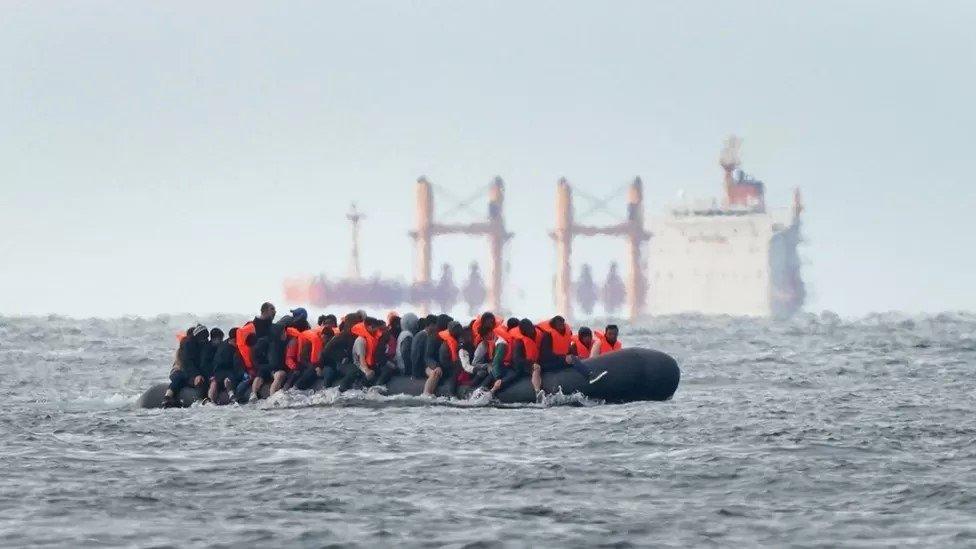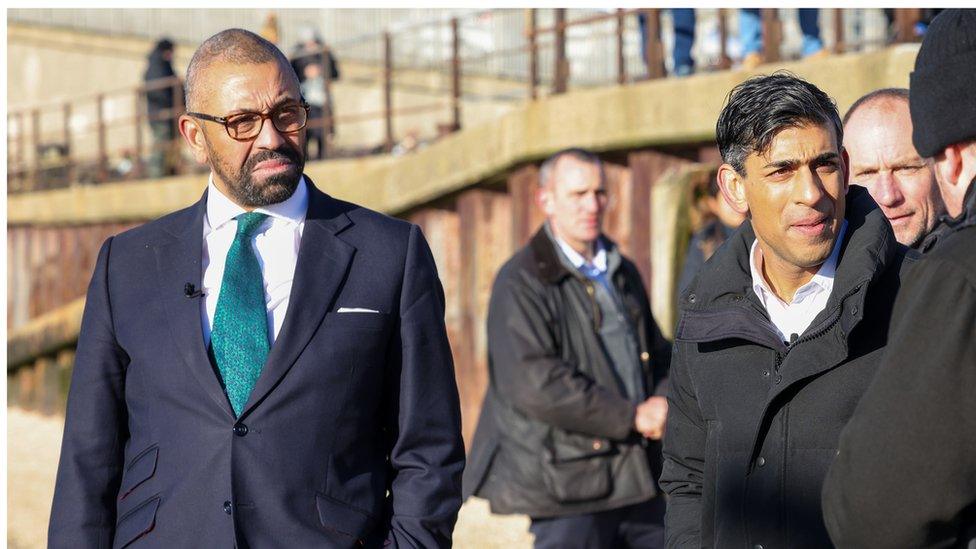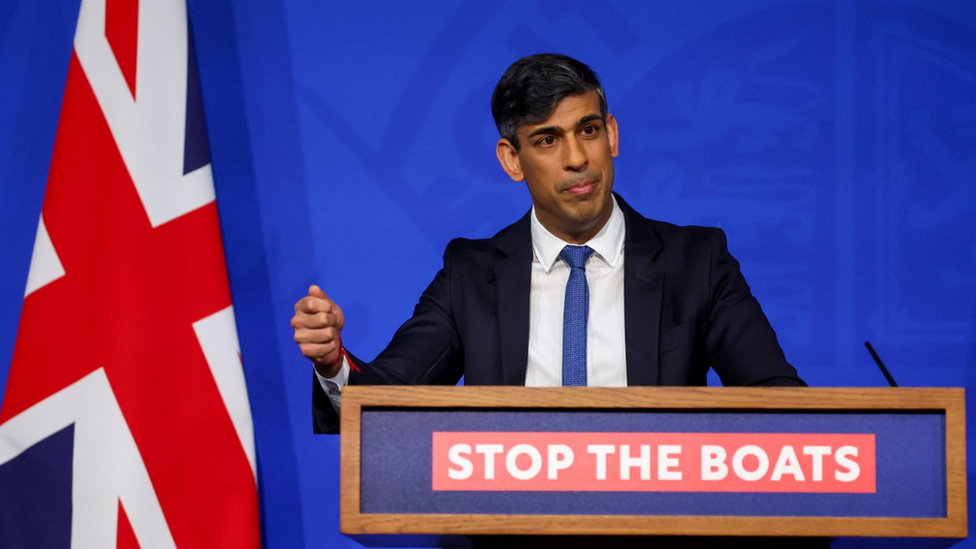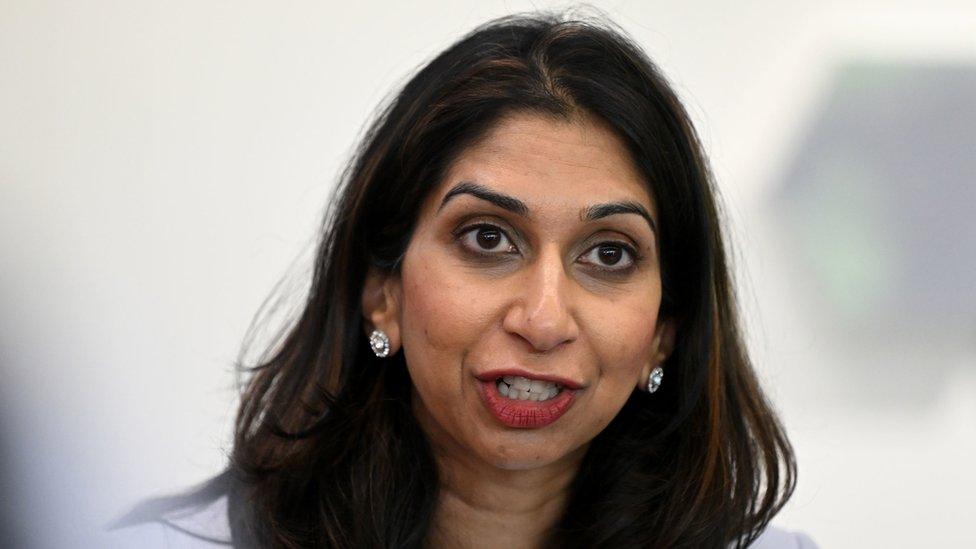Tory deputy chairmen back move to 'beef up' Rwanda bill
- Published
- comments

PM Rishi Sunak is facing a blow to his authority as two deputy Conservative chairmen said they would back rebel amendments to his flagship Rwanda bill.
Lee Anderson and Brendan Clarke-Smith join more than 60 right-wing Tory MPs backing changes to the bill, which returns to the Commons on Tuesday.
The bill seeks to revive the PM's plan to send some asylum seekers to Rwanda, ruled unlawful by the Supreme Court.
The work and pensions secretary said all Tory MPs want the plan to succeed.
Mell Stride said: "We all have the same aim here to deliver a robust bill.
"There are very strong feelings about this legislation and that is understandable, because we all passionately in the Tory party want to deliver a deterrent that is going to stop boats."
Former prime minister Boris Johnson, who originally launched the Rwanda scheme, has backed amendments tabled by right-wing rebels.
In a social media post,, external he said: "This bill must be as legally robust as possible."
Conservative MP Miriam Cates, who has tabled 16 of the amendments, said she would be willing to vote the Rwanda Bill down if Rishis Sunak does not accept her changes.
Ms Cates, who chairs the New Conservatives group, told BBC Radio 4's Today programme: "I would be prepared [to vote against the bill]. But what I really want to see is the government to accept these amendments."
She said that defeat for the government at that stage could still mean the Rwanda policy gets going before the general election later this year.
Mr Anderson said he agreed with "90% of the bill" but wanted it "beefed up".
"This is not a rebellion," Mr Anderson told GB News. "We just feel that there's a few areas in the bill that could be tightened up to make sure that it's watertight."
As deputy chairmen, Mr Anderson and Mr Clarke-Smith are expected to support government bills, though they do not hold government roles.
The proposed amendments are not expected to pass, as both the government and opposition parties are likely to vote them down.
If the amendments are rejected, rebel backbenchers will have to decide whether or not to support the bill, without the changes they want.
Just 29 Tory MPs voting against the bill on Wednesday could derail the legislation.
However, asked if he would vote against it without any changes, Mr Clarke-Smith said: "Not necessarily… We have to weigh that up at the time."

Rishi Sunak reiterated his desire to get his Safety of Rwanda Bill passed while on a visit to Leigh-on-Sea, Essex
In a bid to deter people from trying to get to the UK across the Channel in small boats, the government wants to send some asylum seekers to Rwanda. Labour has criticised the policy as an expensive "gimmick" and says it would prioritise tackling the smuggling gangs.
The government's Rwanda policy was blocked by the Supreme Court on the grounds of concerns about the safety of the east African country.
Following the court decision, the government introduced the Safety of Rwanda Bill which states that in UK law, Rwanda is a safe country.
It also allows ministers to ignore emergency orders from the European Court of Human Rights to suspend a flight to Rwanda while an individual legal case was being heard.
The plans have been criticised from both sides of the Conservative Party, with those on the right fearing it would not prevent legal challenges, while MPs from the party's One Nation group are concerned that any hardening of the bill would risk breaking international law.
Robert Jenrick - who resigned as immigration minister last year - and veteran MP Sir Bill Cash have tabled a number of amendments to the bill aimed at restricting an individual's ability to block their own removal and allowing human rights law to be bypassed.
Writing in the Daily Telegraph, external, Mr Jenrick has said that, over the last 30 years, successive governments have shown "complete disdain" for voters' concerns about immigration.
"This is utterly corrosive to trust in democratic politics, and in an election year when the British public has their chance to mark our work, it is a recipe for electoral wipeout," he said.
Damian Green, chairman of the One Nation group, said: "We've made our position clear. For all our reservations...we want the government to carry it through unamended."
Former Justice Secretary Robert Buckland said he supported the government's wish to send some asylum seekers to Rwanda but changes were needed.
He told BBC Radio 4 Today programme the bill would benefit from being "much simpler" and from removing clauses which seek to limit the jurisdiction of the courts.
'Get destroyed'
Other Conservative MPs, including Sir Simon Clarke, Mark Francois, Sir John Hayes and Danny Kruger - as well as former home secretary Suella Braverman - have suggested they could oppose the entire bill if changes are not made.
Sir Simon told BBC Politics Live that if left unamended there was "every reason" to believe it would "fail on contact with reality".
He warned that if the bill did not work, the Conservatives would "get destroyed" in the general election, expected to take place this year.
Meanwhile, Business Secretary Kemi Badenoch has not denied a report in The Times, external that she privately warned the plans did not go far enough.
The United Nations High Commissioner for Refugees (UNHCR) said the Rwanda plan was "not compatible" with international refugee law in a new assessment.
The UNHCR, the UN's Refugee Agency, has also said the revived plan "does not meet the required standards relating to the legality and appropriateness of the transfer of asylum seekers and is not compatible with international refugee law".
It comes after a YouGov opinion poll indicated the Conservatives were on course for huge losses in the election.
The polling, reported by the Telegraph,, external suggests the party could be reduced to just 169 seats.
- Published15 January 2024
- Published13 June 2024

- Published12 January 2024
